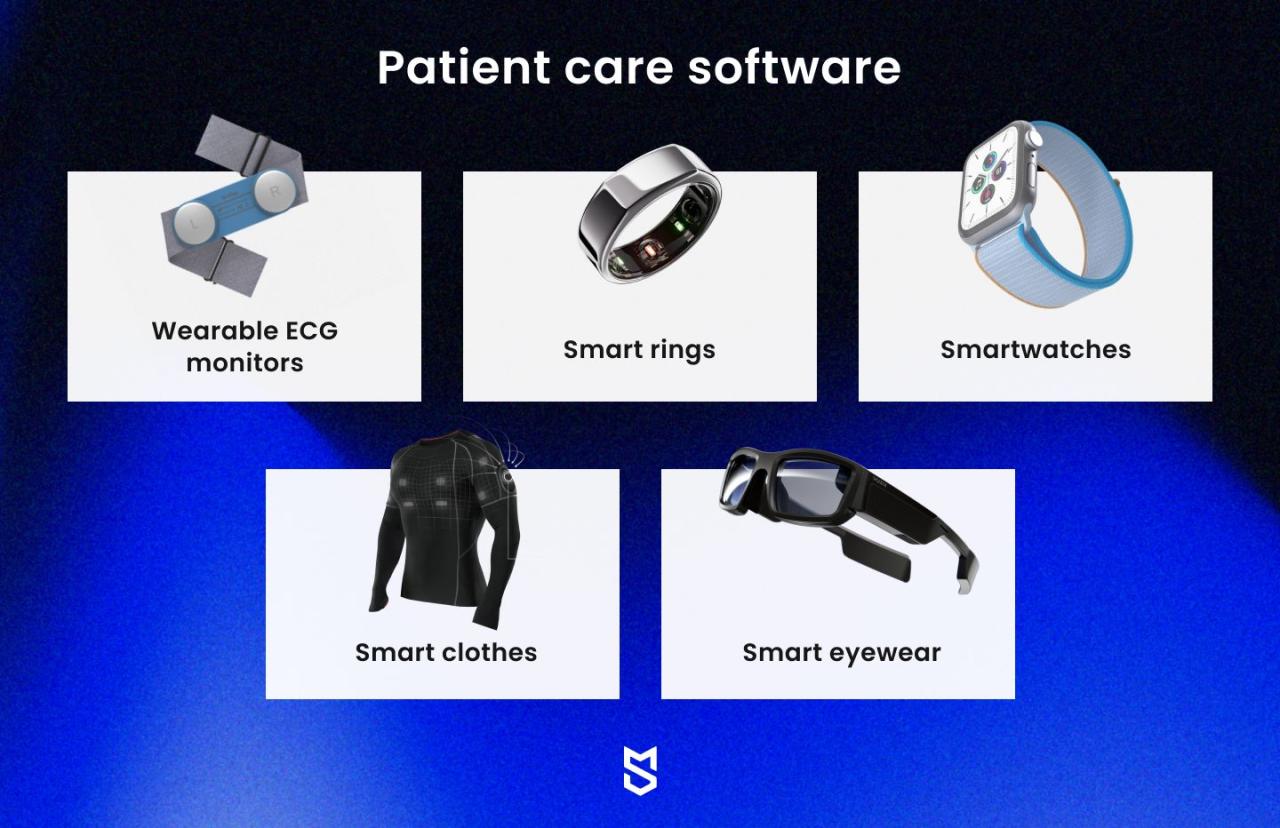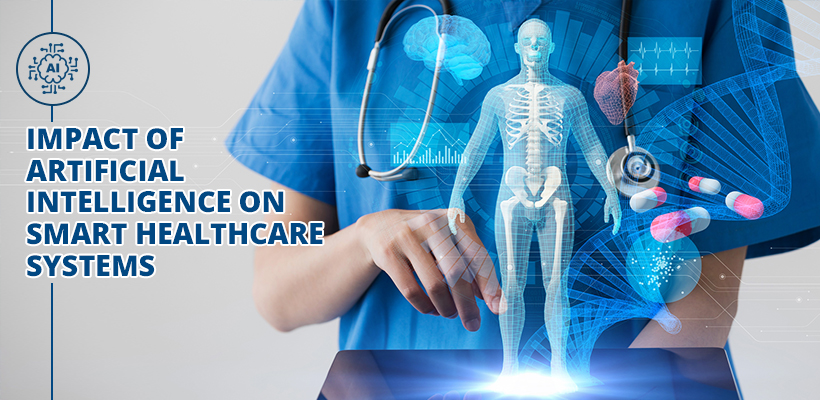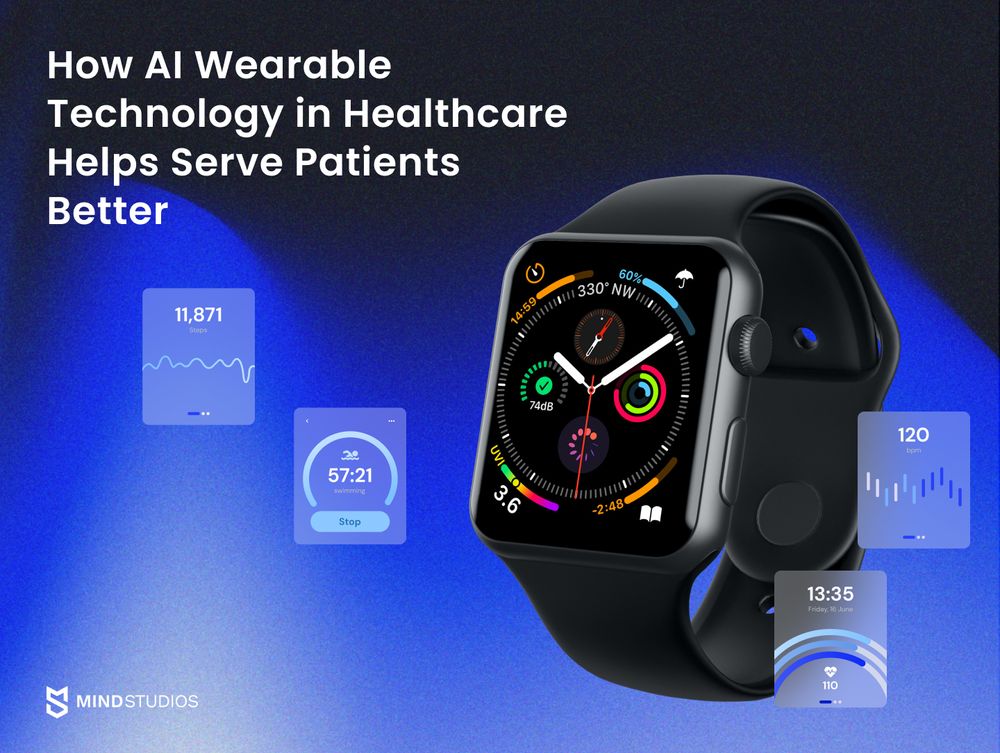Embark on a journey into the realm of smart healthcare devices and AI, where innovation and technology intersect to revolutionize patient care. This captivating introduction sets the stage for a deep dive into the transformative impact of these groundbreaking advancements in healthcare.
Delve into the intricacies of smart healthcare devices and AI, as we uncover the endless possibilities they offer for improving medical services and patient outcomes.
Smart Healthcare Devices

Smart healthcare devices refer to innovative gadgets and tools that utilize technology, such as sensors, connectivity, and artificial intelligence, to monitor, diagnose, and manage health-related data and conditions.
Examples of Popular Smart Healthcare Devices
- Fitbit: A wearable device that tracks activity levels, heart rate, sleep patterns, and more to help users stay active and monitor their health.
- Apple Watch: With features like ECG monitoring, fall detection, and workout tracking, the Apple Watch serves as a smart health companion for users.
- Alexa Healthcare Skills: Amazon's Alexa can be integrated with various healthcare apps and devices to provide health-related information and reminders.
Benefits of Using Smart Healthcare Devices in Patient Care
- Remote Monitoring: Patients can be monitored from a distance, allowing healthcare providers to track their progress and intervene if necessary.
- Personalized Care: Smart devices can collect data specific to an individual's health, allowing for tailored treatment plans and interventions.
- Early Detection: Devices like smartwatches can detect irregularities in vital signs, enabling early detection of health issues before they escalate.
- Improved Engagement: Patients are more engaged in their health when using smart devices, as they can actively monitor their progress and make informed decisions.
AI in Healthcare

AI, or Artificial Intelligence, plays a crucial role in revolutionizing the healthcare industry by enhancing efficiency, accuracy, and personalized patient care. By leveraging AI technologies, healthcare providers can analyze vast amounts of data, streamline processes, and improve diagnostic and treatment outcomes.
Applications of AI in Healthcare
- Medical Imaging Analysis: AI algorithms can analyze medical images such as X-rays, MRIs, and CT scans to detect abnormalities or assist in diagnosis.
- Predictive Analytics: AI can predict patient outcomes, disease progression, and recommend personalized treatment plans based on historical data.
- Virtual Health Assistants: AI-powered chatbots and virtual assistants can provide patients with medical information, schedule appointments, and offer guidance on healthcare queries.
- Drug Discovery and Development: AI algorithms can accelerate the drug discovery process by analyzing molecular structures, predicting drug interactions, and identifying potential candidates for clinical trials.
Comparison of Traditional Healthcare Practices with AI-integrated Systems
- Efficiency: AI-integrated systems can automate repetitive tasks, reduce administrative burden, and optimize resource allocation, leading to improved operational efficiency compared to traditional practices.
- Accuracy: AI algorithms can analyze complex data patterns and provide more accurate diagnoses, treatment recommendations, and predictions compared to human capabilities alone.
- Personalized Medicine: AI can analyze individual patient data, genetic information, and lifestyle factors to tailor treatment plans and interventions, moving towards personalized healthcare approaches not achievable with traditional methods.
Integration of AI in Smart Healthcare Devices
AI integration in smart healthcare devices has revolutionized the healthcare industry, enhancing the capabilities and efficiency of these devices. By leveraging artificial intelligence, smart healthcare devices can analyze data, make predictions, and provide personalized insights to users.
AI-Powered Features in Smart Healthcare Devices
- Remote Monitoring: AI allows smart healthcare devices to remotely monitor vital signs and health parameters, providing real-time feedback to healthcare providers.
- Diagnostic Assistance: AI algorithms can analyze medical images, such as X-rays and MRIs, to assist healthcare professionals in making accurate diagnoses.
- Personalized Recommendations: Smart devices powered by AI can offer personalized recommendations for diet, exercise, and medication based on individual health data.
- Predictive Analytics: AI enables smart healthcare devices to predict potential health issues or complications, allowing for proactive interventions.
Impact of AI Integration on Functionality and Efficiency
The integration of AI in smart healthcare devices has significantly improved their functionality and efficiency. By automating tasks, analyzing data faster, and providing more accurate insights, AI helps healthcare professionals make informed decisions and deliver better patient care. Patients also benefit from personalized recommendations and proactive monitoring, leading to improved health outcomes.
Data Privacy and Security
In the realm of smart healthcare devices, data privacy and security are paramount concerns that need to be addressed to ensure the trust and confidence of patients and healthcare providers.AI plays a crucial role in safeguarding patient data by implementing advanced encryption techniques, access controls, and anomaly detection algorithms.
These systems can identify and respond to any unauthorized access attempts or unusual patterns that may indicate a security breach.
Measures to Protect Sensitive Information
- Encryption: All data stored or transmitted by smart healthcare devices should be encrypted to prevent unauthorized access.
- Access Controls: Implement strict access controls to ensure that only authorized individuals can view or modify sensitive information.
- Anomaly Detection: AI-powered systems can continuously monitor data activity and identify any unusual patterns that may indicate a security threat.
- Regular Audits: Conduct regular audits to ensure compliance with data privacy regulations and identify any vulnerabilities that need to be addressed.
- Data Minimization: Collect and store only the necessary information to reduce the risk of exposure in case of a security breach.
Remote Monitoring and Telemedicine
Remote patient monitoring and telemedicine have become increasingly important in the healthcare industry, especially with the advancements in smart healthcare devices integrated with AI technology. These innovative solutions allow for continuous monitoring of patients' health metrics and enable virtual consultations with healthcare providers, improving access to care and patient outcomes.
Smart Healthcare Devices for Remote Monitoring
Smart healthcare devices equipped with AI technology, such as wearable fitness trackers, blood pressure monitors, and glucose meters, can collect real-time data on patients' vital signs and health parameters. This data is then transmitted to healthcare professionals for remote monitoring, allowing for early detection of potential health issues and timely interventions.
Role of Telemedicine in Virtual Healthcare Services
Telemedicine utilizes smart devices to facilitate virtual consultations between patients and healthcare providers. Through video calls, secure messaging platforms, and remote monitoring tools, telemedicine offers convenient access to medical care without the need for in-person visits. This is particularly beneficial for patients in rural or underserved areas, as well as those with mobility limitations.
Enhancements of AI in Telemedicine Practices
AI enhances telemedicine practices by enabling predictive analytics, personalized treatment recommendations, and virtual health assistants. Machine learning algorithms can analyze large datasets to identify trends and patterns in patient health, allowing for more accurate diagnoses and treatment plans. Additionally, AI-powered chatbots can provide immediate support to patients, answering common health questions and guiding them through self-care routines.
User Experience and Interface Design
User experience plays a crucial role in the design of smart healthcare devices, as it directly impacts how users interact with and benefit from these devices. The interface design of these devices is a key factor in ensuring ease of use, accessibility, and overall satisfaction for the users.
Importance of User Experience in Designing Smart Healthcare Devices
Creating a positive user experience in smart healthcare devices is essential for encouraging regular use and engagement. It involves understanding the needs and preferences of the users, designing intuitive interfaces, and providing clear feedback. By focusing on user experience, designers can enhance the overall usability and effectiveness of these devices.
- Personalization: Tailoring the device interface to individual user preferences and needs can improve engagement and adherence to treatment plans.
- Accessibility: Ensuring that the device is easy to use for individuals of all ages and abilities is crucial for maximizing its impact on healthcare outcomes.
- Feedback Mechanisms: Providing real-time feedback and data visualization can empower users to make informed decisions about their health and wellness.
AI Contribution to Improving User Interfaces of Smart Healthcare Devices
Artificial intelligence plays a significant role in enhancing user interfaces of smart healthcare devices by enabling personalized recommendations, predictive analytics, and natural language processing capabilities. AI algorithms can analyze user data to provide relevant insights and suggestions, making the device interactions more seamless and user-friendly.
- Personalized Recommendations: AI can analyze user behavior and health data to offer personalized recommendations for improving health outcomes.
- Predictive Analytics: By leveraging AI algorithms, smart healthcare devices can anticipate user needs and provide proactive support and guidance.
- Natural Language Processing: Integrating AI-powered voice assistants can enhance the user experience by enabling hands-free interactions and intuitive communication with the device.
Design Considerations for Creating User-Friendly Smart Healthcare Devices
When designing smart healthcare devices, several key considerations should be taken into account to ensure a user-friendly experience. From intuitive interfaces to seamless connectivity, these design elements can make a significant difference in how users engage with and benefit from the devices.
- Intuitive Interface: Designing a simple and intuitive interface can help users navigate the device easily and access relevant information quickly.
- Seamless Connectivity: Ensuring compatibility with other devices and platforms can enhance the overall user experience and streamline data sharing and management.
- Data Privacy: Implementing robust security measures to protect user data and privacy is essential for building trust and confidence among users.
Final Summary

In conclusion, the integration of AI in smart healthcare devices opens up a world of opportunities for enhanced patient care and streamlined medical processes. As we navigate this evolving landscape, the future of healthcare looks brighter and more efficient than ever before.
FAQ Compilation
How do smart healthcare devices benefit patient care?
Smart healthcare devices offer real-time monitoring, personalized treatment plans, and improved communication between patients and healthcare providers.
What are some examples of AI applications in healthcare?
AI is used for diagnostic imaging analysis, predictive analytics, virtual health assistants, and drug discovery.
How does AI ensure data privacy and security in smart healthcare devices?
AI algorithms are designed to encrypt and protect sensitive patient data, ensuring confidentiality and compliance with privacy regulations.
What role does telemedicine play in utilizing smart healthcare devices?
Telemedicine enables remote consultations, monitoring, and diagnosis through smart devices, expanding access to healthcare services.